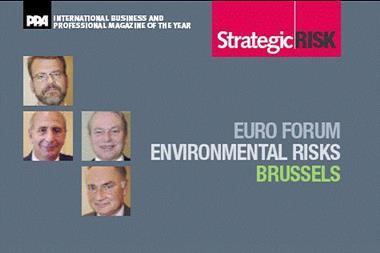Risk managers should view environmental risks as part of their core risk activity, warns Aon
Risk managers of all organisations must now view environmental risks as part of their core risk management, according to Aon Global directors Bob Martin and Marcel Steward, speaking at an environmental risk management workshop at the Airmic conference.
Aon believes that environmental risks can represent the largest potential liability for many companies. Yet they are often unquantifiable and unrecognisable. This is currently dissuading many companies from taking even the basic steps of any risk management process, to identify and assess these risks.
In the workshop, Aon demonstrated how an apparently daunting task can be broken down into “bite size” pieces. Each “bite” can then be tackled with the help of an appropriate specialist environmental risk management and risk finance advisor.
Having identified and evaluated the risks, Martin and Steward advised that physical measures and contractual conditions need to be considered as potential solutions before attention is turned to risk finance measures. They then dispelled many of the myths and misconceptions that are propagated by non-specialists in regard to environmental impairment liability insurance covers, going on to outline where these can then be used in a cost efficient manner to minimise premium spend.
Environmental risk management continues to rise on boardroom agendas. There is an absolute need for directors to take a top-down view of internal control systems in accordance with the Turnbull guidance. And with the EU's proposed Environmental Crime Directive, advocating up to ten years imprisonment for directors who are responsible for legal non-compliance, risk managers are likely to find a receptive audience for their message.
Steward said: "With the flow of new environmental law showing no sign of abating, risk managers are living in a fool's paradise if they are still using costs of claims or regulatory issues from the past to justify their expectancy of similar minimal costs in the future, or why they are not taking any action on environmental risk management."
















